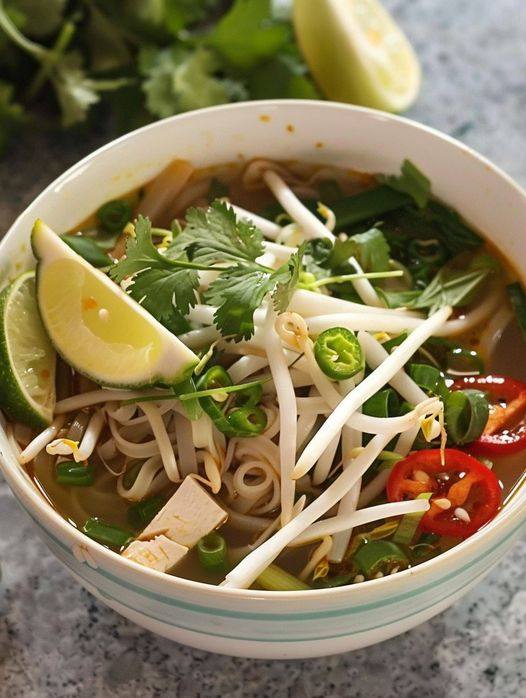In the realm of culinary delights, few dishes captivate the senses quite like a steaming bowl of pho. Originating from Vietnam, this aromatic and soul-warming soup has transcended borders, captivating palates across the globe. Traditionally crafted with rich beef broth, tender slices of meat, and an array of herbs and spices, pho embodies a symphony of flavors that dance harmoniously on the taste buds. However, in today’s diverse culinary landscape, the desire for plant-based alternatives has sparked a creative reimagining of this beloved dish.
Enter the vegan pho – a vibrant and nourishing rendition that pays homage to the essence of traditional pho while embracing the bounty of plant-based ingredients. This culinary masterpiece seamlessly marries the essence of Vietnamese cuisine with the principles of veganism, resulting in a bowl of comfort that is both wholesome and satisfying.
At its core, vegan pho celebrates the art of simplicity, drawing inspiration from nature’s bounty to create a broth that is both flavorful and nutritious. By eschewing animal products in favor of plant-based ingredients such as mushrooms, seaweed, and aromatic spices, this recipe offers a compassionate alternative without compromising on taste or authenticity.
What truly sets vegan pho apart is its versatility and adaptability. Whether you’re a seasoned chef or a novice in the kitchen, this recipe invites you to explore a world of flavors and textures, allowing you to customize your bowl according to your preferences and dietary needs. From hearty vegetables to protein-rich tofu or tempeh, the options are endless, making each bowl a unique culinary adventure.
But beyond its culinary prowess, vegan pho embodies a deeper ethos of sustainability and mindfulness. By embracing plant-based ingredients, this recipe champions environmental stewardship and ethical consumption, offering a delicious reminder of the interconnectedness between food and the planet.
In essence, vegan pho is more than just a dish – it’s a celebration of culture, compassion, and creativity. So, whether you’re seeking a comforting meal on a chilly evening or embarking on a culinary journey of discovery, let this recipe be your guide to a world of flavor, one spoonful at a time.
Here is some Important tips:
Gut Health:
Plant-based diets are often associated with improved gut health due to the high fiber content from fruits, vegetables, and whole grains. A healthy gut microbiome is linked to better digestion and overall well-being.
Anti-Inflammatory Properties:
Many plant-based foods have anti-inflammatory properties, which can help in reducing inflammation in the body. Chronic inflammation is associated with various health issues, and a vegan diet may contribute to its prevention.
Sports Performance:
Contrary to the misconception that vegan diets lack protein, many successful athletes follow plant-based diets to enhance their performance. Plant-based proteins can support muscle building and recovery.
Reduced Risk of Foodborne Illnesses:
Plant-based diets eliminate the risk of foodborne illnesses associated with the consumption of undercooked or contaminated animal products.
Economic Impact:
A vegan diet can be more economical as plant-based protein sources tend to be cost-effective compared to some animal products. It may be a budget-friendly option for individuals or families.
Mindful Eating:
Adopting a vegan lifestyle often promotes mindful eating. Being more conscious of food choices and sources can lead to a healthier relationship with food and a greater appreciation for the environmental impact of dietary decisions.
Preservation of Biodiversity:
The expansion of animal agriculture often leads to habitat destruction and loss of biodiversity. Choosing a vegan diet supports the preservation of ecosystems and the protection of various species.
Culinary Diversity:
Veganism introduces individuals to a diverse range of cuisines and ingredients from around the world. Exploring plant-based cooking can be a culinary adventure, embracing flavors and techniques from different cultures.
Reduced Antibiotic Resistance:
The use of antibiotics in animal farming contributes to the rise of antibiotic-resistant bacteria. Opting for a vegan diet can be a way to reduce the demand for such practices and promote responsible antibiotic use.

